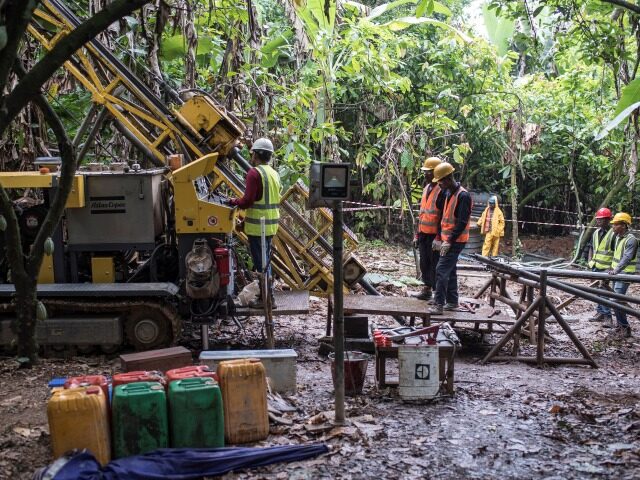The government of China denied on Tuesday details in a report accusing its companies of bribing Nigerian terrorists in exchange for safe access to mineral-rich territories in the African country.
The original report, published last week by the U.K. newspaper The Times, claimed that “militant leaders” in the embattled country are openly bragging on social media about how much money they make from Chinese bribes. The videos, allegedly obtained through the firm SBM Intelligence, show Nigerian terrorists claiming that Chinese companies are comfortable paying “rent” and have become a lucrative income source for them.
China has invested heavily in the past decade in expanding its influence throughout Africa, particularly through its Belt and Road Initiative (BRI). The BRI offers poor countries predatory loans through Chinese banks to be used to pay Chinese contractors to build roads, ports, and other infrastructure products. When the victim countries cannot pay back the loan, China seizes control of the projects.
In Africa, the BRI has been particularly damaging to local industries and resulted in widespread reports of human rights abuses, in many cases racist attacks on local workers or the establishment of segregated worker areas to keep locals from the vicinity of imported Chinese workers.
Nigeria joined the BRI in 2018 and has approved multiple railway projects under the BRI umbrella.
The Chinese Embassy in Abuja, Nigeria, issued a statement on Tuesday calling the Times report on bribes to terrorists based on “unverified, unclear, and unproven information.”
“The Chinese government was and would never be involved in any form of funding terrorism. The allegations contained in the report were totally irresponsible and unethical, and the intention of the report is seriously questioned,” the statement read.
“We will continue to work with the Nigerian government to promote development and address security issues,” the note concluded. “We welcome international partners to join our efforts in good faith, but would reject any intention or action that would smear our cooperation.”
The statement did not address the specifics of the claims in the Times report.
The Times cited the Nigerian SBM Intelligence in reporting that Chinese operatives are actively paying off local criminals and terrorists in northern Nigeria, particularly Zamfara and Katsina states. Northern Nigeria is home to most of the country’s Muslim population and attracts a variety of terrorist organizations, including the Islamic State affiliate Boko Haram and the little-organized gangs of Fulani jihadists who regularly attack Christian villages.
SBM Intelligence uncovered the social media messages of terrorists bragging about their profits from Chinese company “rents.”
“Insurgents discuss the payments on social media,” the Times narrated. “Sources on the ground in the states of Zamfara and Katsina have confirmed that, in the words of Ikemesit Effiong, SBM’s head of research, ‘these guys [Chinese company representatives] are perfectly willing to pay off whoever needs to be paid off and have no qualms about it and are allowed to carry out operations.'”
The British newspaper claimed that bribes have become so common that they have created new “job” opportunities for men who serve as “runners for Chinese miners.” It identified only one terrorist group by name as having profited from Chinese mining operations in the country: Boko Haram.
The Chinese Communist Party signed a memorandum of understanding with the government of Nigeria in 2019, vowing to help Abuja combat Boko Haram and other terrorist insurgencies. Beijing has consistently expressed worries that it would not be able to expand its economic cooperation with Nigeria to where it would like that relationship to be without eradicating terrorism, especially given an increase in kidnappings of Chinese nationals in the country in pursuit of ransom.
“China’s central government is really concerned about the security situation in Nigeria and also Chinese nationals in Nigeria,” Chinese Ambassador to Abuja Cui Jianchun said in 2021, “so now the central government made the decision to send a high-level delegation from the criminal investigation experts with real experience.”
More recently, in January, the Rand Corporation published a report unveiling that China had deployed private military and security contractors (PMSCs) to Nigeria in addition to increasing weapons sales in the face of growing insecurity there.
The Chinese miners are reportedly looking to exploit Nigeria’s vast gold and rare-earth mineral resources, particularly ore containing lithium, a critical mineral for mobile phones, laptops, and electric vehicle batteries. China is Nigeria’s largest trade partner, and Beijing has invested in dominating the mining industry there in particular. In 2019, a report by the Nigerian branch of the Extractive Industries Transparency Initiative (NEITI) found that China was responsible for 68 percent of mineral exports out of Nigeria in 2017. Last year, the same organization found that 80 percent of Nigeria’s minerals went to China in 2020.
The Nigerian Premium Times newspaper reached out to the government of the African country for comment on the Times report but did not receive a concrete response as of Monday.

COMMENTS
Please let us know if you're having issues with commenting.